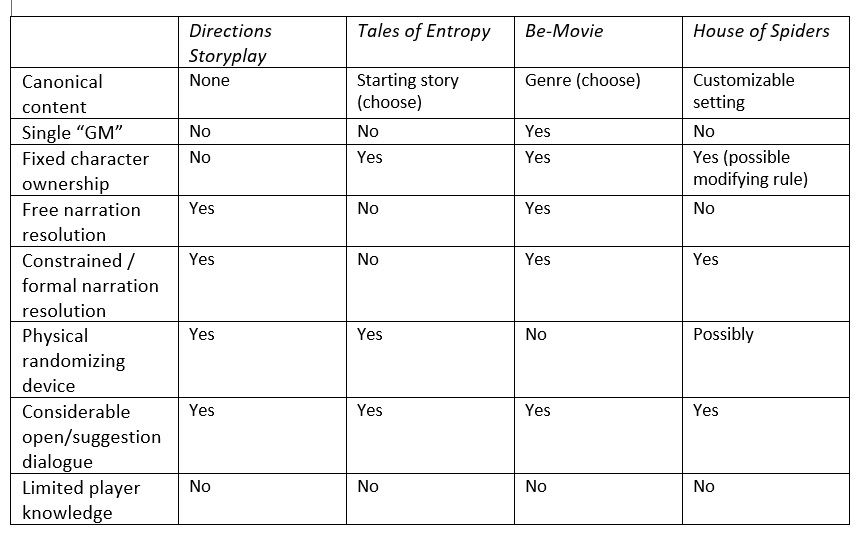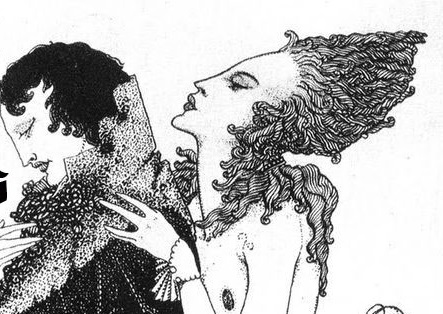Who could have asked for a better inadvertent experiment in comparative design? Four consulting clients, one specific historical ideal of role-playing experience, similar influences and familiarities with games and ideas, resulting in four non-converging, distinctive games. Directions Storyplay, Tales of Entropy, Be-Movie, and this one, Jeff Slater’s House of Spiders.
Here’s a summary of some of their comparative features.

My conclusion is that this family or perceived sphere of game design is not defined by such things as “no single GM,” or “love of a good story,” or “make up your own setting,” or “pure narration not dice,” but specifically by a kind of table-talk, a specific social atmosphere, relative to player knowledge about what is going on. In other words, this is not a system or even a “style” (a term I dislike), but a distinctive technique which is either highly preferred or highly not preferred. It’s been wrongly associated with other techniques and wrongly elevated to an ideal or even, explicitly in historical game texts, to the status of the “purest” form of role-playing.
All right, on to House of Spiders!! Unlike the others, it’s in an early design stage, which I find much easier to work with. There are some features currently left up to “figure it out when we get there,” and inspiration plays a powerful role, more so than production plans. Our discussion focused hard on the organization of play, rather than the precise details of resolution, and the moments of decisive impact on the developing events (“story”).
Among the various, almost playful what-if talk we did about the system, I think the one I’m least satisfied with concerns when someone would get the tokens we talked about. We talked a lot about what the group might do with them, but not enough about getting them in the first place. The problem is that Jeff conceived of them as solving a problem, i.e., the tendency of multi-narrator stories to scatter and sprawl. So the idea was that you gained a token by Weaving (precisely the concept and term I used in Sex & Sorcery), i.e., by making what you were saying right now relevant to other events and characters in play. You can do it all sorts of ways, by introducing back-story information, or some current consequence, or whatever.
The first concern I have about that is whether it’s necessary in the first place, as there’s no point in solving a problem that isn’t there. The second concern is harder: what’s the point of rewarding something that someone who “gets” the game will be doing anyway? And how is judging the acquisition of a token to be done? Are there criteria for not getting one? If not, they’re worthless due to inflation, but if so, bad judgment lurks in play, especially when unintended.
So now I’m thinking about other ways in which they’re acquired, rarely enough to make them valuable, suited well enough to play to make them enjoyable rather than “exra.”
I don’t mention this until the end of the video, but looking it over now, I realize what my driving force was: what I see as the really satisfying aesthetic of the game.
- Influence: trust and distrust, loyalty and conscience, promises and payments
- Privilege: perceived virtue, authority through violence, social stability and instability, status vs. wealth
- Control of information: unwelcome truths, withheld truths, lies, compartmentalization
- Patience: the tension of the right time vs. too late, the contradiction of preserving a passionate impulse for future ends
The magical-realism, low-medieval setting works very well for it, and needs the bare minimum of gaudy fantasy like zombie armies and incipient dragon swarms. It reminds me of the novels of Graham Shelby, which are as full of violence and cruelty as one may imagine from the Crusades, but are also studies in power through standing, through threat, through lies, through unwelcome truths, and through personal passions. Dosing such work with a bit of fantasy is very powerful too – a single walking dead, one (“the!”) manticore …
Something else that occurred to me while editing is the driving historical presence of the game Amber, which I’ve inexplicably failed to mention through the course of talking about these games so far. There’s a lot to discuss – the almost total disconnection between its textual rules and how it’s referenced (“like in Amber,” “well, in Amber you …”); the quick shift from table-top to heavily-staged LARP play (one of the earliest); the interrelationship between playing the game and contributing to the published fiction (the Merlin series is flatly playerfic); and frank discussion about what playing it is really like, without being perceived as bashing the source material or its fandom.


4 responses to “Lies, patience, and creepy grit”
Jeff, please ignore if this is not helpful…
…but I wanted to say that I had a pretty visceral reaction to the cover image, and then this bit that Ron wrote:
Such that I kind of had to watch the video right this instant. And I'm pleased that you managed to articulate your vision of what playing House of Spiders might be like as the discussion went on, it sounded like it could be really nail biting / gut punching / all that good stuff. (Especially pleased as initially I did think "oh, he's going to waste that cool cover on Game of Thrones"
because I am an awful snobwhen, based on the rest of the conversation, I don't think you need to sell your game that way). Anyway consider this an +1 to Ron's enthusiasm in the video, not sure I really have anything more constructive to add.I agree, Ross…
…I should probably stop using GoT as a shorthand to explain what House of Spiders is like. It’s just an easy way to invoke the idea that courtly intrigue, Machiavellianism, power, ect is a central part of the game, by referencing something people are familiar with. Thanks for letting me know how it made you perceive the game and how it might not be the best way to discribe it.
Best,
Jeff
It’s a tricky decision. One
It's a tricky decision. One can hardly help pointing to whatever most familiar property shares some features, perhaps important ones, with the new thing. The listener's familiarity with and liking for the property seems like the perfect bridge to come check out this new thing. Sometimes, that's true. But then there's the question of whether that person is committed to the property in a social or aesthetic way – and if so, then their interest in your thing is very dubious. Either it's not enough like it, so "not good enough, only has this or that thing like X so it's not complete," or it's too much like it, so "well X does it already."
I'm trying to explain it this way to keep away from the aesthetics and possibly snobbery that lead me not to like Game of Thrones, and to say that if the reference had been something I really liked, then maybe the recommendation to avoid over-referencing it would still apply.
I strongly agree with this,
I strongly agree with this, and really like Ron's analysis of the themes and focal points of play. That really sells me on the game, too!
I DO think that Game of Thrones, being such a popular property these days, is an excellent touchstone for this game. However, it might be worth saying, "Here's what the game does. ONE example of the kind of thing you can do with it might be to create something like Game of Thrones."
I look forward to hearing about how this all turns out (and probably playing it together)!